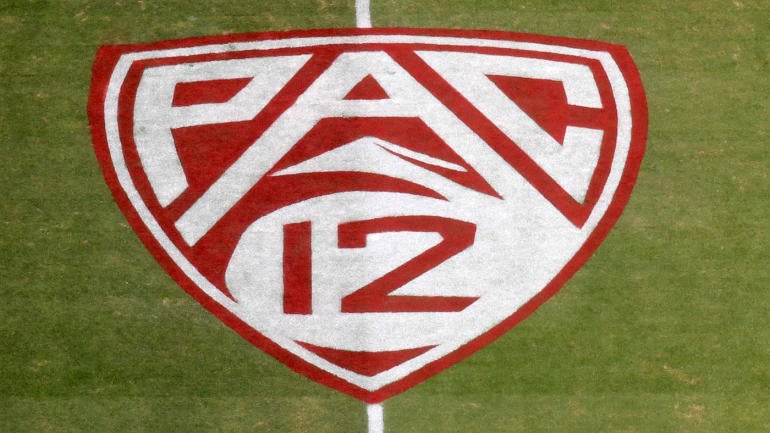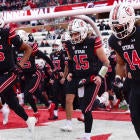
A Tuesday afternoon meeting with conference presidents and chancellors led to the Pac-12 deciding to cancel its fall 2020 college football season and postpone all fall sports through the calendar year amid the COVID-19 pandemic. The move comes after the Big Ten elected to cancel its fall season earlier on Tuesday. Both conferences hope to play the season in spring 2021 but have not announced any specific plans.
"All of the Pac-12 presidents and chancellors understand the importance of this decision, and the disappointment it will create for our student-athletes, the coaches, support staff and all of our fans," said Oregon president Michael H. Schill. "Ultimately, our decision was guided by science and a deep commitment to the health and welfare of student-athletes. We certainly hope that the Pac-12 will be able to return to competition in the New Year."
Want more college football in your life? Listen below and subscribe to the Cover 3 College Football podcast for top-notch insight and analysis beyond the gridiron.
"The health, safety and well-being of our student-athletes and all those connected to Pac-12 sports has been our number one priority since the start of this current crisis," said Pac-12 commissioner Larry Scott. "Our student-athletes, fans, staff and all those who love college sports would like to have seen the season played this calendar year as originally planned, and we know how disappointing this is."
The Pac-12's vote was unanimous, and it was made after "consultation with athletics directors and with the Pac-12 COVID-19 Medical Advisory Committee who expressed concern with moving forward with contact practice." Athletes will have their scholarships guaranteed while also receiving "university support, including academic advising and tutoring, among other support services." The Pac-12 is also urging the NCAA to grant those athletes an additional year of eligibility.
"Unlike professional sports, college sports cannot operate in a bubble," Scott said. "Our athletic programs are a part of broader campuses in communities where in many cases the prevalence of COVID-19 is significant. We will continue to monitor the situation and when conditions change we will be ready to explore all options to play the impacted sports in the new calendar year."
Sentiment throughout college football entering Sunday night was that the Big Ten and Pac-12 would cancel their seasons this week. However, the combination of outspoken coaches and the #WeWantToPlay X #WeAreUnited movement that developed suddenly late Sunday seemed to give pause to the five major conferences.
While the Big Ten's coaches were outspoken about wanting to play, the Pac-12's coaches were largely silent. Perhaps that is because the league's coaches and athletic directors were reportedly given "eye-opening" information Monday evening from Pac-12 doctors, specifically regarding myocarditis, a heart condition that can develop as a result of battling the coronavirus. The condition involves an inflammation of the heart muscle. It can reduce the heart's ability to pump, causing rapid or abnormal heartbeat.
Though COVID-19 had previously been linked to longer-lasting heart complications, the medical advice given to Pac-12 decision-makers was apparently enough to lead them to pull the plug on playing this fall.
Myocarditis emerged as a significant health concern that largely led to the Big Ten's decision, according to CBS Sports' Dennis Dodd. At least 15 Big Ten players have been left with myocarditis after contracting COVID-19, according to a high-ranking source within the Big Ten.
"Myocarditis is the ballgame right now," the source told Dodd. "Myocarditis is the major issue they're looking at. … Between the Pac-12 and the Big Ten, that's what is really driving the push to push this off to spring."
In its latest medical guidelines, the NCAA said infected persons "of any age" with underlying heart conditions are a risk. There's at least one Power Five school where athletes who test positive for the coronavirus automatically get an EKG. Big 12 commissioner Bob Bowlsby told the Associated Press on Sunday there was "growing evidence" of concern over myocarditis. Medical experts have told West Virginia athletic director Shane Lyons that moving to the spring "will give us more time to be able to understand if the virus does necessarily impact the heart."
Recovery from myocarditis can vary anywhere from a few weeks to a few months, according to Harvard Medical School.
The Big Ten, for weeks, was considered the most likely to punt on football in the fall, but the Pac-12 was viewed as a conference tethered to its hip. If the Big Ten canceled or even delayed the start of football, the Pac-12 likely wasn't far behind. That played out on Tuesday.
Will the three other Power Five conferences follow suit with canceling their fall 2020 seasons? The SEC and ACC appear prepared to move forward, while the Big 12 is currently in limbo.
Though cancellations have been taking place at all levels of college football, only recently did they affect the 130-team FBS. UConn was the first FBS team to call curtains on a fall 2020 season last week; UMass followed suit on Tuesday. The MAC was the first FBS conference to call off playing fall sports; it was joined by the Mountain West on Monday. Old Dominion on Monday became the first individual member of an FBS conference (Conference USA) to cancel its season.
More than 30 Power Five players have opted out of playing this season.
There are now 77 of 130 FBS teams (59%) set to play the 2020 college football season at this time.
















